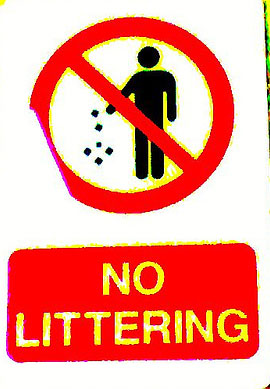
It was reported in the news recently that postal workers who drop red rubber bands, which are used for bundling letters in the street are being targeted by anti litter campaigners.
Those caught doing this will be faced with on-the-spot fines of £80, Keep Britain Tidy also claimed that 6% of England’s streets are littered with rubber bands, a danger to animals if they are swallowed.
The figures come after the charity’s local environment quality survey, which records what litter is found on 19,000 streets across streets in England each year. Fines for littering can reach as high as £2,500, in cases which go too caught.
Litter is defined as anything that is thrown, dropped or deposited in public place, creating an eyesore and/or environmental damage. This includes
· Sweet wrappers and chewing gum on pavements
· Dog fouling
· Fly posters
· Fly tipping
· Abandoned vehicles
The most common types of litter are cigarette ends, sweet wrappers, matchsticks, drink cans and fast food wrappers.
Dog mess is a health hazard as it contains parasitic nematode that can cause blindness in babies and small children. Fly tipped rubbish can contain toxic substances. It is sometimes found in locations where it is hazardous to the public and wildlife. Chewing gum is very difficult and costly to remove from the pavements. It takes a lot of time and money to clear up litter, and costs around 5 million to deal with all the abandoned supermarket trolleys each year.
Littering is just generally bad. It is damaging to the earth, and can potenially be very dangerous to individuals. I also don’t think there’s any need for it. Are people really that lazy, that they would rather litter, and take risks than recycle is it really that difficult to dispose of litter in the correct way?
http://news.bbc.co.uk/1/hi/uk/7984849.stm
No comments:
Post a Comment